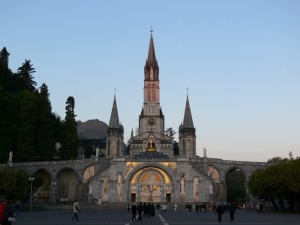
By Sarah Mac Donald - 09 September, 2013
 Archbishop Diarmuid Martin of Dublin has said the presence of the sick among us reminds us of “the emptiness that the rat-race and self-centredness causes in our lives.”
Archbishop Diarmuid Martin of Dublin has said the presence of the sick among us reminds us of “the emptiness that the rat-race and self-centredness causes in our lives.”
In his homily to 2,000 sick pilgrims, medics, priests, students, teachers and volunteers from Dublin who are in Lourdes as part of the largest Irish diocesan pilgrimage, the Archbishop said it is the sick who remind us of the deeper meaning of our lives.
“The way of faith is the way of the cross, not the way of the comfort zones that we can easily create around ourselves,” he said and added that the Gospel tells us, “you cannot be a half-baked believer.”
Pondering how a Christian is to live in a consumer driven world, he highlighted that there is a global industry and pattern of life based on “tempting us to believe that we need certain products and that somehow our life will be happier if we have them.”
Acknowledging that each of us knows his or her own weaknesses, temptations, and compromises, he admitted, we all know how we are attached to the things of this world. “We all know how hard it is to be detached from the luxuries that deep down we know we do not really need.”
Speaking at the Church of St Bernadette in the French shrine, the Archbishop said there was sometimes an idea that those in religious orders have a vow of poverty and that renunciation of possessions is something for them only and does not apply to the rest of us. “The Gospel reading seems to be saying quite the opposite. Unless we give up all our possessions, it says, then we will not be considered disciples,” he warned.
The Primate of Ireland underlined that faith does not necessarily provide “magic answers to the challenges of life. Having faith does not necessarily change the realities of our hearts. Thinking that our faith can provide specific and direct answers to all life’s challenges only leads to fundamentalism,” he warned and added that faith is not a flight from reality.
The contingent of Dublin pilgrims gathered in Lourdes on the day in which the liturgy usually celebrates as the birthday of Our Lady.
“We come as pilgrims and in the experience of Lourdes we begin to learn something of what that new life is like that we are called to lead as Christians. We pray that our pilgrimage this year will be one where we share in prayer and caring for each other in our differing sufferings and anxieties and hopes.”
This year’s diocesan pilgrimage went ahead despite extensive floods in Lourdes in June which caused millions of euro worth of damage at the famous shrine.
Describing Lourdes as “a remarkable place” with a “unique character” Archbishop Martin said it could only be explained by the central figures which mark its history: Mary and Bernadette. Both are models of evangelical simplicity, he said.
The Archbishop also led prayers on Sunday for Syria praying that “those forces in the world which menace the gift of peace” would be overcome.
He joined with Pope Francis to pray “at this place of extraordinary serenity, for peace in Syria and for peace in the world.”
Elsewhere in his homily, Dr Martin warned that an inward looking church, which is “self-referential and closed in on itself – a closed shop preoccupied only with itself” and which is “more attached to itself than to spreading the message of Jesus Christ” would never renew itself.
This does not mean that we can compromise on our faith but rather that we must always be authentic and coherent in our responses, he noted. “When we make plans we must look at the consequences and the risks that are involved and calculate in the light of faith where the true road is.”
He made a plea for an understanding that the Church’s renewal would come not from inward-looking debates but through becoming ever more the place where the compassion and mercy of God is lived out and shared.
In his prayers, Archbishop Martin prayed for the sick and asked the sick to pray for the Church. “We pray for those who attend the sick, many of whom have been coming here year after year. We pray for and with those who come here with the hidden intentions and anxieties of their hearts. We pray for the auxiliary pilgrims who have supported us through their generosity and their prayer.”
He also prayed for the young people who accompanied the sick pilgrims that the experience of Lourdes would give them a renewed sense of what the Church is. “The Church needs your presence,” he said.
He lastly prayed for the priests on the pilgrimage “who represent the great priests who minister in the diocese of Dublin” and he prayed for vocations.